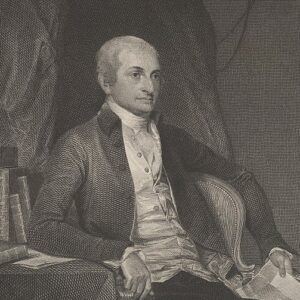John Jay was born on December 12th, 1745, in New York City. Then, New York was one of the thirteen colonies of British America. He came from a wealthy merchant family of French ancestry. After attending French Huguenot Church School, he went to King’s College (Columbia University).
Jay graduated in 1764. In the following years, he became a prominent lawyer in New York. In 1774, his positions earned him a seat in the First Continental Congress. However, unlike many of his colleagues, Jay was not happy about the upcoming conflict with the UK. At first, he did not support the calls for independence.
That changed after he visited the mother nation. Congress sent him to London to negotiate peace. Instead, he realized that the British would never take the American colonies seriously.

✟ May 17, 1829, New Jersey, USA
Federalist and Chief Justice
Upon his return, he drafted the letter to the British government and King George III., stating American demands. In 1776, he played a vital role in the Declaration of Independence. Hence, he is one of the leading Founding Fathers.
John Jay was just 33 years old when in 1778, he became the president of the Second Continental Congress. Further, from 1779, he was a diplomat in Europe. Along with Benjamin Franklin and John Adams, he was responsible for negotiating the Treaty of Paris in 1783, which finally secured independence.
From 1784, he was secretary for foreign affairs. Soon, he realized that the Articles of Confederation were weak and that the nation needed a genuine constitution and was pivotal in adopting it in 1789. Besides, he teamed up with Alexander Hamilton and James Madison to write The Federalist. They all supported a strong federal government.
In 1789, George Washington appointed Jay as the first chief justice o the Supreme Court. He held this prestigious position until 1795. For the next six years, he was the governor of New York.
He was married to Sarah Livingston and had six children. Just like Thomas Paine, he is sometimes undeservedly overlooked. John Jay, a devoted federalist, died on May 17th, 1829, in Bedford, New Jersey.
No power on earth has a right to take our property from us without our consent.
John Jay
